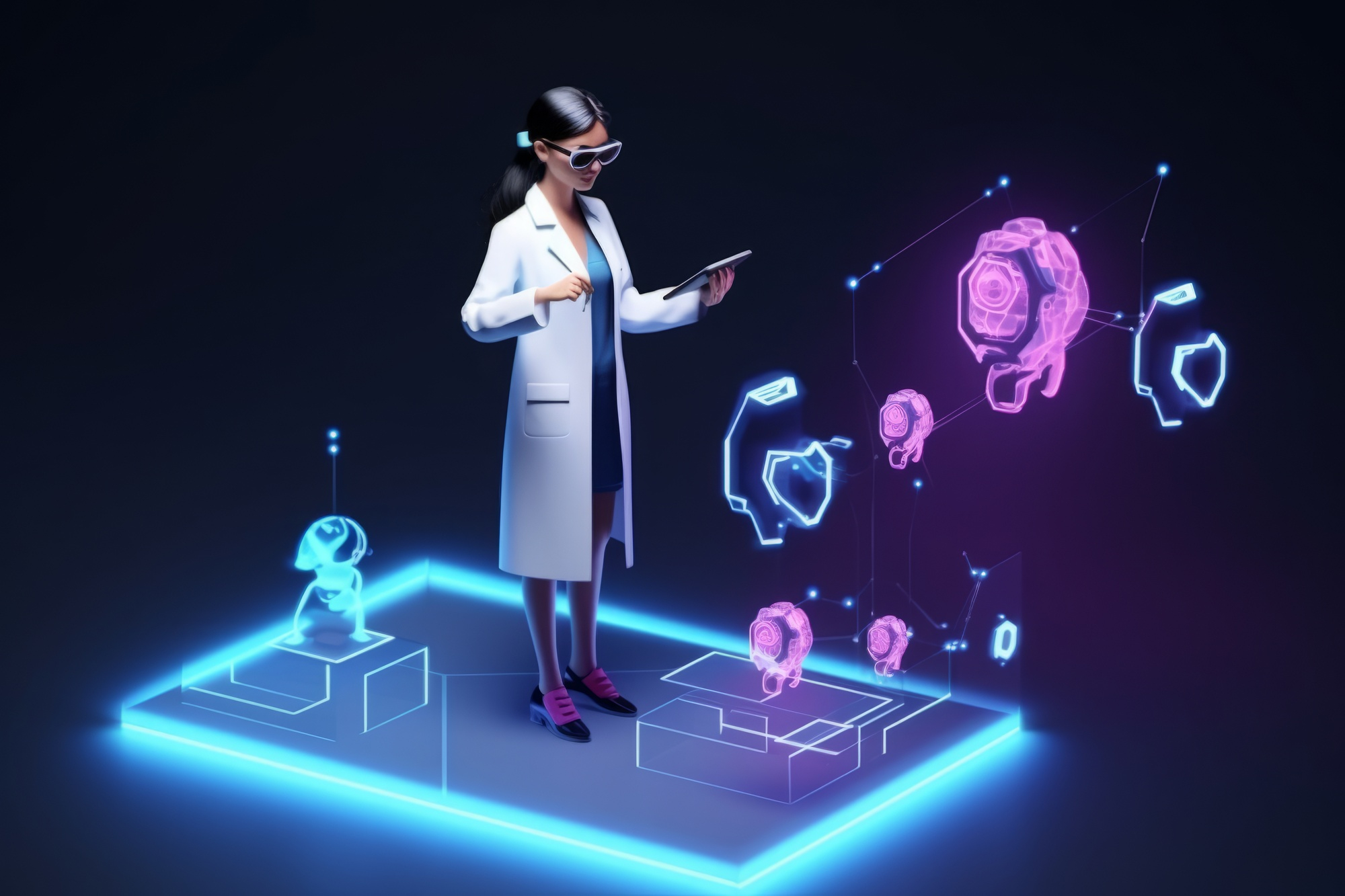Artificial Intelligence (AI) is rapidly transforming industries, with healthcare standing out as one of the most impacted sectors. As we enter 2024, AI’s role in healthcare is becoming a game-changer, revolutionizing diagnostics, patient outcomes, clinical research, and more. From predictive analytics to robotic surgeries, AI is more than just a tool; it’s a catalyst for change, reshaping the way healthcare is delivered.
AI in Diagnostics: Detecting Diseases Earlier and More Accurately
AI is revolutionizing diagnostics by detecting diseases with remarkable precision, often earlier than traditional methods. Some examples include:
- Radiology Assistance: AI tools analyze X-rays, CT scans, and MRIs to spot anomalies that might be overlooked by human eyes.
- Early Cancer Detection: Google’s DeepMind and similar AI technologies are now capable of predicting breast cancer years in advance, improving survival rates.
These innovations not only reduce diagnostic errors but also allow doctors to provide more personalized and timely treatment.
AI-Powered Personalized Medicine: Tailoring Treatments for Better Outcomes
Gone are the days of “one-size-fits-all” treatments. AI is making personalized medicine a reality by tailoring treatment plans based on a patient’s unique genetic makeup, medical history, and lifestyle. Key applications include:
- Pharmacogenomics: AI helps predict how a patient will respond to specific medications, ensuring more effective treatments.
- Chronic Disease Management: AI-driven apps monitor real-time health data and suggest interventions, improving long-term management of conditions like diabetes and hypertension.
This shift towards precision medicine is not only improving patient outcomes but also reducing healthcare costs by optimizing treatments.
Robotic Surgery: Precision, Safety, and Accessibility
AI-integrated robotic surgery systems, such as the Da Vinci Surgical System, are making surgeries more precise and less invasive. In 2024, these advancements include:
- Minimally Invasive Procedures: AI helps surgeons navigate complex anatomy, leading to reduced recovery times and less post-operative discomfort.
- Remote Surgeries: Surgeons can perform procedures remotely using AI tools, making expertise available to underserved areas with limited access to specialized care.
By reducing human error and enhancing precision, robotic surgeries offer safer and more consistent outcomes.
Predictive Analytics: Preventing Illness Before It Strikes
AI is also excelling at predicting health trends, enabling both individual and population-level prevention strategies. Notable uses include:
- Risk Assessments: AI models predict the likelihood of conditions like strokes or heart attacks based on individual patient data.
- Pandemic Preparedness: AI analyzes global health data to detect early warning signs of emerging infectious diseases, helping prevent widespread outbreaks.
By predicting future health issues, AI allows healthcare providers to act proactively, saving lives and resources.
AI in Mental Health Care: Bridging the Gap
Mental health is another area where AI is having a significant impact. In 2024, AI is helping make mental health care more accessible and effective through:
- Chatbots for Therapy: Tools like Woebot offer Cognitive Behavioral Therapy (CBT)-based support 24/7, providing users with immediate assistance.
- Sentiment Analysis: AI is being used to analyze speech patterns and social media activity to detect early signs of mental health issues like depression or anxiety.
By expanding access to mental health resources, AI is addressing a critical gap in healthcare.
Wearable AI: Empowering Continuous Health Monitoring
Wearable devices like smartwatches and fitness trackers are now powered by AI, providing real-time insights into health metrics such as:
- Heart Rate and ECG Monitoring: AI-powered wearables can detect irregularities and notify users of potential cardiac events.
- Glucose Tracking for Diabetics: Non-invasive AI sensors monitor glucose levels, helping people with diabetes manage their condition more effectively.
These wearables enable individuals to take charge of their health, promoting preventive care and timely interventions.
AI-Driven Drug Discovery: Accelerating Medical Research
AI is accelerating the traditionally slow and costly process of drug discovery. In 2024:
- Molecule Identification: AI can rapidly identify promising compounds for new medications.
- Clinical Trial Optimization: AI algorithms help select appropriate candidates for clinical trials, reducing both time and cost.
This technology is particularly valuable for developing treatments for rare or neglected diseases, which often face limited research funding.
AI in Radiotherapy: Precision Cancer Treatment
AI is making strides in radiotherapy, a critical component of cancer treatment. Key benefits of AI in this field include:
- Targeted Radiation: AI improves the accuracy of radiation therapy by mapping tumors with precision, sparing healthy tissue.
- Adaptive Therapies: AI can adjust radiation treatment plans in real-time based on how the patient is responding.
These advancements are improving the effectiveness of cancer treatments and reducing harmful side effects.
AI in Administrative Tasks: Reducing Healthcare Worker Burnout
AI is also streamlining administrative tasks in healthcare, allowing professionals to focus more on patient care. Key applications in 2024 include:
- Automated Scheduling: AI systems simplify appointment booking and patient follow-ups, improving workflow efficiency.
- Medical Coding and Billing: AI ensures more accurate documentation and faster reimbursements, reducing administrative burdens.
By handling repetitive tasks, AI reduces burnout among healthcare workers, improving job satisfaction and patient care.
AI in Healthcare Today: Real-World Applications
AI is already making a tangible impact in healthcare through various real-world applications:
- PathAI: Uses AI to revolutionize pathology and improve cancer diagnosis accuracy.
- Babylon Health: Offers AI-powered virtual consultations, allowing patients to receive immediate medical advice.
- Zebra Medical Vision: Leverages deep learning algorithms to detect conditions from medical imaging data.
- Tempus: Analyzes clinical and molecular data to advance precision medicine and oncology research.
These examples demonstrate how AI is enhancing efficiency, accuracy, and accessibility in healthcare.
AI and Telemedicine: Expanding Access to Healthcare
Telemedicine is thriving with AI-powered advancements in 2024, including:
- Virtual Health Assistants: AI-powered chatbots help triage patient concerns and provide immediate guidance.
- Language Translation: AI bridges language barriers, facilitating smoother telehealth consultations for non-native speakers.
Telemedicine, powered by AI, is expanding healthcare access, especially in rural or underserved areas, making it a complement to traditional healthcare.
Conclusion: The Future of Healthcare is AI-Driven
AI’s applications in healthcare are transforming the industry, making medical care smarter, faster, and more efficient. From diagnostics to treatment, AI is driving breakthroughs that were once unimaginable. As the technology continues to evolve, staying informed about its applications is essential—not only for healthcare professionals but also for patients who stand to benefit immensely.
As we move forward, AI will play a pivotal role in shaping the future of medicine, improving outcomes, reducing costs, and providing more accessible care for everyon




